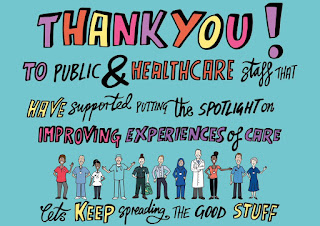Yesterday I was in Cardiff, visiting my Mum and Dad. I
went to see them partly because today is Mothering Sunday, and partly
because my Mum was one of the 90,000 people who will have a knee operation in 2017. Every year 3 in 5 people aged 35 – 60 years old will experience knee related health problems. Some 6 million working days are lost each year due to such problems. My Mum had a total knee
replacement (arthroplasty) 9 weeks ago. In the UK, such an operation costs around £6000
a go. She is making slow but steady progress and it was lovely to spend time
with my parents.
The operation itself was very successful, and the wound healed well, and
thankfully my Mum didn’t come down with a hospital acquired infection. She did,
however, experience great postoperative pain and bouts of severe confusion. Although my Mum is in an age group where the length of stay is likely to be greater than the normal 4 days for such an operation, she was actually in hospital for 20 days. Such an
extended stay in hospital resulted from it proving difficult to arrange and ensure an
appropriate discharge plan was put in place. The hospital didn’t appear able to co-ordinate and organise care with the local community services.
She might still be there, had it
not been for my Dad telling the hospital he
could provide home care (despite my advice to the contrary). This was undoubtedly true, but the net result was my
Mum was precipitously discharged and that was that. No after care planned, no physiotherapy,
home help and none of the anticipated adaptions and aids were put in place. There
wasn’t even a discharge letter to give to the GP. Thankfully some of my
brothers, sisters and brother-in-law’s were able to help get the
house organised (bed downstairs), prepare some meals for the freezer and so on.
Professional help only started to happen when a few day later, my Mum, struggling to manage her pain, called her GP for a home visit. A young locum GP arrived and was
appalled at the lack of ‘service join up’ and the way in which my Mum had, for all
intents and purposes, been 'abandoned'. Before she left, the GP had arranged for
Social Services to call, sorted out physiotherapy visits and prescribed different pain relief medication. It was a great move forward, but such care
should have been planned, and provided without her intervention. I was very disappointed in the
poor experience of care given to my Mum, particularly from a public service
I feel so passionately about trying to improve.
And it’s not just me who shares
this ambition. Last week was NHS Experience of Care week. The week's aim was both straightforward, bold and important: recognise the need to constantly
improve the experience of care for all (patients, carers and staff);
promoting a more inclusive approach to improving experiences of care; more
effectively support improvements at a service
provider and commissioner level; and through the use of social media and other approaches to communication, generate greater interest and awareness
of the how care is experienced.
Lots of fantastic things were reported
last week about peoples experiences of care and how the experience of care might be
improved - you can catch up here #ExpofCare – and one of those leading on this
work was the Experience of Care Lead at NHS England, Kath Evans. She is a real tonic,
a sparkly kind of person, who whilst describing herself as 'always facing the
sun', actually brings much sunshine, joy and comfort into the lives of others,
particularly children and young people of all ages. More of which later.
And last Wednesday saw another
example of care being provided, unreservedly and with skill and knowledge. I am
referring to the terror attack on the Houses of Parliament, which saw 5 people
killed. It was a cowardly attack, devastating, brutal and life changing for many. However, when the attack
happened, good people immediately rushed to provide help and care for those
left injured and dying. These carers ran into the danger rather than away from
it. And as John Bradford said 400 years before I was born, 'there but for the
grace of God go I'.
The final word goes to Adam
Bojelian. He was just 15 years old when he died in 2015. He was born with cerebral
palsy and he lost all ability to move his body when he was just 10 months old.
Blinking was his only form of communication. Despite this he wrote poems with
his Mother's help. She would watch as he used his eyelids to indicate the correct
letter as she went painstakingly through the alphabet. Adams poems gained international
recognition. Here is a blog that Adam wrote in 2013 about what in his experience, good care
looked like.



No comments:
Post a Comment